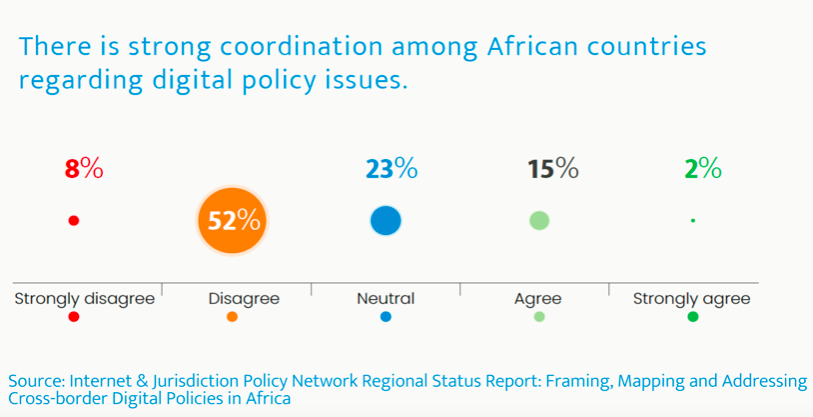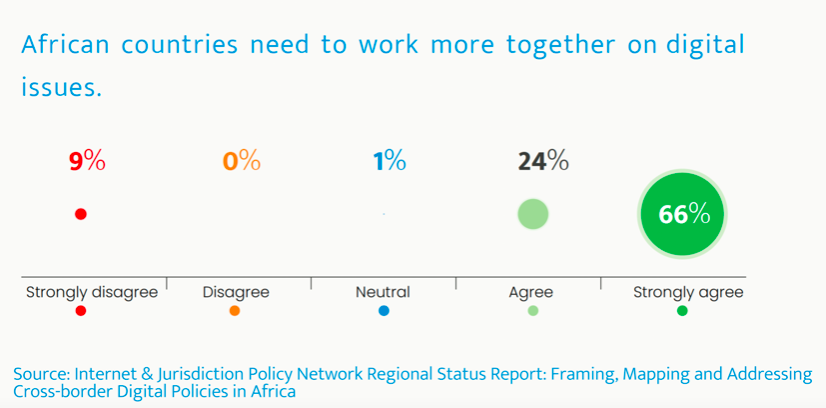By Winnie Kamau
Nairobi, Kenya: In a world where technology and innovation have taken center stage, countries across the African continent have had to grapple with the challenge of balancing the benefits of the digital world with the need to regulate and manage it.
This has led to the creation of cross-border digital policies that aim to promote the growth of the digital economy while also protecting citizens from online risks.

One of the key challenges facing African countries is the lack of standardization in digital policies across the continent. Each country has its own set of laws and regulations that govern the use of digital technologies and the internet, making it difficult for businesses to operate seamlessly across borders. To address this, the African Union (AU) has taken a lead role in creating a harmonized framework for digital policies in Africa.
The recent report by the Internet & Jurisdiction Policy Network released at the 17th Internet Governance Forum, in Addis Ababa, Ethiopia last December, identified a significant need for African countries to enhance coordination around data policies.
 The report dubbed “Internet & Jurisdiction Report on Framing, Mapping, and Addressing Cross-Border Digital Policies in Africa” is the accumulation of knowledge and stakeholder inputs gathered during a year-long project, supported by Deutsche Gesellschaft für Internationale Zusammenarbeit (GIZ) on behalf of the German Federal Ministry BMZ.
The report dubbed “Internet & Jurisdiction Report on Framing, Mapping, and Addressing Cross-Border Digital Policies in Africa” is the accumulation of knowledge and stakeholder inputs gathered during a year-long project, supported by Deutsche Gesellschaft für Internationale Zusammenarbeit (GIZ) on behalf of the German Federal Ministry BMZ.
“More policy coordination is needed across Africa to leverage the benefits of digital technologies and especially data. Surveyed stakeholders across the region emphasized that progress towards harmonization should require human rights safeguards and take into account development capacities and national contexts” said Bertrand de La Chapelle, Executive Director and Co-founder of the Internet & Jurisdiction Policy Network.

However, the growth of the digital economy has also brought new challenges, including online fraud, data breaches, and cybercrime. To address these risks, African countries have taken steps to strengthen their cybersecurity frameworks and protect their citizens from online threats. For example, many countries have implemented strict data protection laws that require businesses to protect personal data and ensure privacy rights are upheld.
“As Africa seeks to build its path and strengthen its regional voice in global policy debates we hope that this report will help support further dialogue and evidence-based research to foster coordination on cross-border digital policies across the region,” said Dr. Alison Gillwald, Executive Director, Research ICT Africa and Author of the report.
In recent years, the African Union has launched initiatives aimed at promoting the development of the digital economy, including the establishment of a single African digital market and the development of digital infrastructure to support the growth of e-commerce and digital services. The aim is to create an environment that enables businesses to reach a larger customer base and foster cross-border trade, ultimately contributing to economic growth and development on the continent.
AU’s efforts to create a harmonized framework like the AU Data Policy Framework and the Digital Transformation Strategy for Africa (2020-2030) are said they will play a key role in creating a digital economy that benefits everyone.

Data sovereignty can be realized without data localization through reciprocal protection of personal data and continental policies to share benefits. There is generally a data deficit on the continent, particularly in accurate data and data-sharing structures that can foster the attainment of Sustainable Development Goals (SDGs).
The report recommends a common African voice in international fora should advocate for data policies that support inclusive development, encourage cross-border data flows, and uphold both individual as well as collective rights.
Emphasis has been made on Cross-border digital policies in Africa which are crucial in promoting the growth of the digital economy while also protecting citizens from online risks. It is yet to be seen if the African Union’s efforts to create a harmonized framework for digital policies will play a key role in creating a digital economy that benefits everyone.














